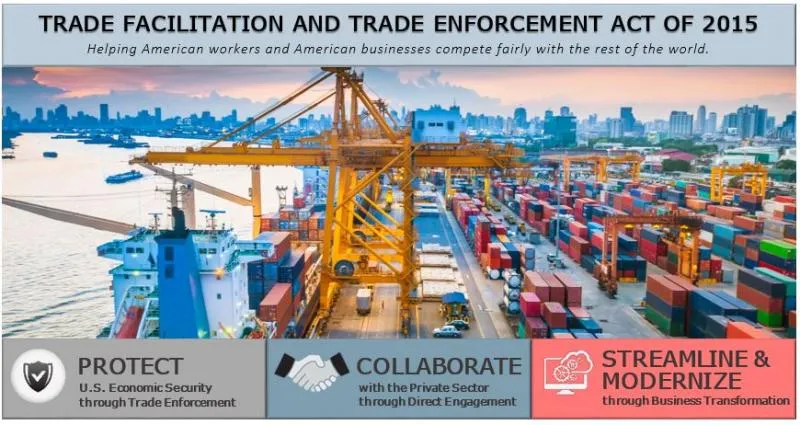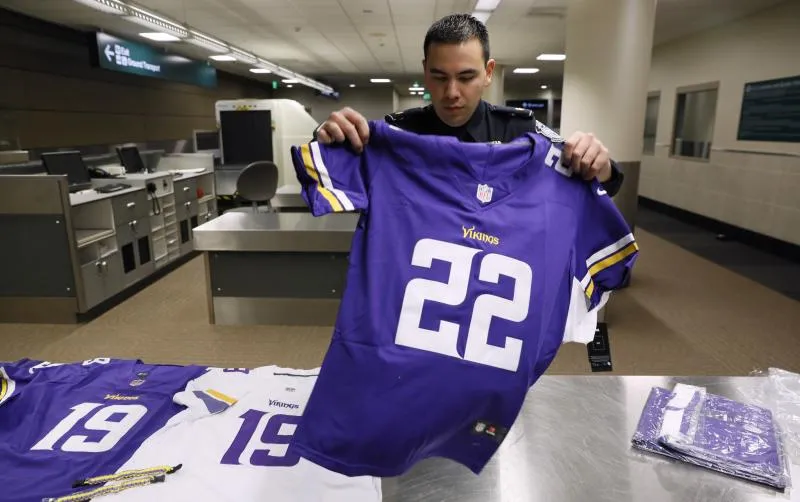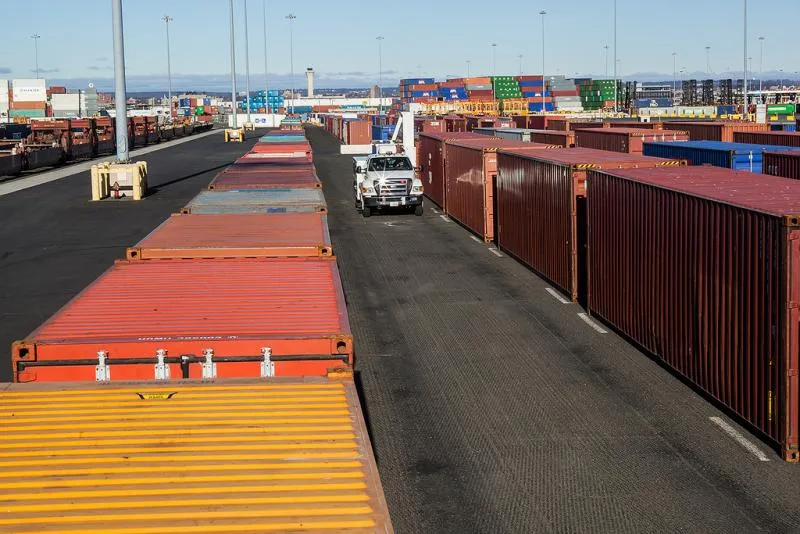Agency marks the second anniversary of key legislation.
WASHINGTON – U.S. Customs and Border Protection (CBP) continues to make progress in implementing the Trade Facilitation and Trade Enforcement Act of 2015 (TFTEA) on the Act’s two year anniversary. TFTEA, the first comprehensive authorization of CBP since the Department of Homeland Security was created in 2003, reshapes, strengthens and modernizes how CBP accomplishes its trade mission. The Act supports CBP’s continuing efforts to ensure a fair and competitive trade environment for American businesses and the American people.
 “Since its enactment two years ago, implementing the provisions of TFTEA has been a top priority for CBP,” said Acting Commissioner Kevin McAleenan. “CBP has made significant progress in our efforts to protect American consumers and businesses from fraudulent trade activities while ensuring the swift flow of legitimate, fair, and safe imports entering the U.S. stream of commerce.”
“Since its enactment two years ago, implementing the provisions of TFTEA has been a top priority for CBP,” said Acting Commissioner Kevin McAleenan. “CBP has made significant progress in our efforts to protect American consumers and businesses from fraudulent trade activities while ensuring the swift flow of legitimate, fair, and safe imports entering the U.S. stream of commerce.”
With its additional TFTEA authorities, CBP continues to investigate unfair trade practices. Title IV, Section 421, commonly referred to as the Enforce and Protect Act of 2015, or EAPA, established formal procedures for the investigation of antidumping or countervailing duty evasion allegations against U.S. importers. Since August 2017, when EAPA came into force, CBP has initiated 16 investigations, preventing the evasion of more than $45 million in antidumping and countervailing duties annually.
CBP has used the additional authorities provided under TFTEA to prohibit the entry of goods made by forced labor, including forced child labor, into the United States and also established a Forced Labor Division within the Office of Trade. CBP seized more than 10,000 cartons of frozen squid, valued at more than $200,000, in November 2017 that was processed with North Korean forced labor. To date, CBP, in collaboration with its interagency partners, including the Department of Labor, which compiles lists of goods that are likely produced by forced labor, has detained 57 shipments of goods, valued at $6.3 million, that are suspected of involving forced labor.
 CBP has also implemented a new mechanism to protect Intellectual Property Rights (IPR), enabling owners of unregistered copyrights whose application for registration is pending with the U.S. Copyright Office (USCO) to record their online application with CBP at https://iprr.cbp.gov. Once recorded, unregistered copyrights receive the same benefits of border protection and enforcement as copyrights that are registered with the USCO. Furthermore, exercising its new authority under TFTEA to partner with the private sector, CBP announced a partnership this month with Procter & Gamble (P&G) as part of the Donations Acceptance Program. P&G donated testing devices to be used by CBP officers to prevent counterfeit P&G products from entering the United States.
CBP has also implemented a new mechanism to protect Intellectual Property Rights (IPR), enabling owners of unregistered copyrights whose application for registration is pending with the U.S. Copyright Office (USCO) to record their online application with CBP at https://iprr.cbp.gov. Once recorded, unregistered copyrights receive the same benefits of border protection and enforcement as copyrights that are registered with the USCO. Furthermore, exercising its new authority under TFTEA to partner with the private sector, CBP announced a partnership this month with Procter & Gamble (P&G) as part of the Donations Acceptance Program. P&G donated testing devices to be used by CBP officers to prevent counterfeit P&G products from entering the United States.
“TFTEA provides CBP with new tools, authorities and opportunities for private sector collaboration,” said Brenda Smith, Executive Assistant Commissioner (EAC) for CBP’s Office of Trade. “The Act strengthens CBP’s enforcement and facilitation efforts to address current trade risks and aligns our operations with today’s complex business environment.”
CBP’s collaboration with its government and private sector partners is a key component of its trade strategy. CBP works closely with the CBP Commercial Customs Operations Advisory Committee (COAC), a long-standing advisory committee authorized by TFTEA, which consists of representatives from various sectors of the trade community including brokers, importers, exporters, and carriers. Furthermore, with TFTEA authorization, CBP has continued to enhance its industry-centric approach to trade enforcement through CBP’s Centers of Excellence and Expertise (Centers) and deepen its trade expertise through CBP’s industry seminar programs.
 CBP continues to advance its efforts to streamline and modernize its business processes and practices through the Automated Commercial Environment (ACE)—the backbone of the U.S. Government’s “Single Window” system of imports and exports. As authorized by the TFTEA legislation, CBP raised the de minimis value from $200 to $800 and adjusted the threshold in ACE to reduce the costs associated with importing low valued shipments. CBP also recently deployed TFTEA drawback, enabling an automated approach for U.S. manufacturers and businesses to obtain import-paid duty, tax, and fee refunds on exported goods.
CBP continues to advance its efforts to streamline and modernize its business processes and practices through the Automated Commercial Environment (ACE)—the backbone of the U.S. Government’s “Single Window” system of imports and exports. As authorized by the TFTEA legislation, CBP raised the de minimis value from $200 to $800 and adjusted the threshold in ACE to reduce the costs associated with importing low valued shipments. CBP also recently deployed TFTEA drawback, enabling an automated approach for U.S. manufacturers and businesses to obtain import-paid duty, tax, and fee refunds on exported goods.
CBP will continue to implement provisions of TFTEA and leverage all available tools, authorities, and partnerships to increase trade enforcement, facilitate lawful trade, protect economic security and address the risks and challenges of 21st century trade operations.
For additional information on CBP’s progress in implementing TFTEA, visit CBP.gov. Interviews with EAC Smith on CBP’s focus on TFTEA, TFTEA’s impact on CBP/Trade relationship, TFTEA - Enforce and Protect Act, and Forced Labor are available on CBP’s TFTEA - Forced Labor YouTube channel.

